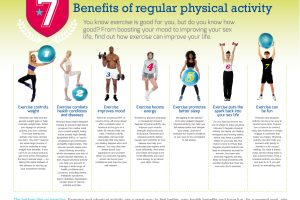The Benefits of Regular Exercise for Your Well-being

Importance of Physical Activity
In today’s fast-paced world, where technology often replaces physical effort, the importance of physical activity cannot be overstated. Regular exercise is a vital cornerstone for maintaining overall health and wellness. It serves not only as a means for physical fitness but also for cognitive and emotional well-being. Many people might recall a time when a brisk walk or a short workout instantly lifted their mood. This phenomenon is more than just a fleeting feeling; it’s backed by science. Various studies show that engaging in regular physical activity can:
- The Benefits of Regular Exercise for Your Well-being
- Importance of Physical Activity
- Connection between Exercise and Well-being
- Physical Benefits of Regular Exercise
- Improved Cardiovascular Health
- Weight Management
- Mental Health Benefits of Regular Exercise
- Reduced Stress and Anxiety
- Boosted Mood and Mental Clarity
- Social Benefits of Regular Exercise
- Building Relationships and Community
- Increased Self-confidence and Self-esteem
- Long-term Benefits of Regular Exercise
- Reduced Risk of Chronic Diseases
- Enhanced Quality of Life in Older Age
- Enhance cardiovascular health: Strengthening your heart and lungs.
- Boost muscle and bone strength: Helping to maintain mobility and independence, especially as one ages.
- Facilitate better sleep: Leading to improved energy levels throughout the day.
For those just starting, it can be beneficial to incorporate small activities daily – perhaps taking the stairs instead of the elevator or going for a walk during lunch breaks. Over time, these small changes can accumulate into significant health improvements.
Connection between Exercise and Well-being
The connection between exercise and overall well-being is profound. It’s not just about building muscle or losing weight; it’s about nurturing the mind and spirit as well. Consider how often people mention feeling “on top of the world” after a good workout. This connection arises from the release of endorphins, often referred to as “feel-good hormones,” which can significantly reduce feelings of stress and anxiety. Additionally, regular exercise helps:
- Enhance cognitive function: Making it easier to think clearly and creatively.
- Bolster resilience to emotional challenges: Arming individuals with tools to cope with life’s stresses.
- Promote social interactions: Creating opportunities to meet like-minded individuals in fitness classes or community sports events.
Engaging in physical activity cultivates a holistic state of well-being, allowing individuals to live more balanced and fulfilling lives. As such, embracing a routine of regular exercise can set the foundation for achieving optimal health and happiness.
Physical Benefits of Regular Exercise
Improved Cardiovascular Health
Continuing from the mental and emotional benefits of physical activity, it’s essential to highlight how regular exercise significantly improves cardiovascular health. Engaging in activities that elevate the heart rate strengthens the heart muscle, reduces blood pressure, and enhances blood circulation. A healthy heart is crucial for overall well-being, as it reduces the risk of heart disease, stroke, and other cardiovascular issues. Imagine a routine where, instead of watching TV after dinner, one decides to take a brisk walk or cycle through the neighborhood. Over time, this simple change can lead to remarkable improvements in heart health. Benefits associated with improved cardiovascular health include:
- Increased heart efficiency: The heart pumps blood more effectively, reducing the strain during physical activities.
- Lower cholesterol levels: Regular exercise can help decrease LDL (bad cholesterol) while increasing HDL (good cholesterol).
- Stronger blood vessels: Helping prevent plaque buildup and facilitating better blood flow.
Starting with just 150 minutes of moderate exercise each week can initiate profound changes in cardiovascular health.
Weight Management
Another vital aspect of physical activity is its role in weight management. Many people struggle with maintaining a healthy weight due to busy lifestyles filled with processed foods and sedentary habits. However, incorporating regular exercise into one’s routine can be a game-changer. For example, consider someone who enjoys cooking but often opts for takeout due to time constraints. By setting aside time for meal prep and pairing it with a physical activity like jogging in the evening, they can enjoy homemade meals while effectively managing their weight. The connection between exercise and weight management can be broken down into a few key points:
- Caloric expenditure: Regular physical activities burn calories, which can create a caloric deficit, leading to weight loss.
- Muscle building: Exercise increases muscle mass, which in turn boosts metabolism, allowing the body to burn more calories even at rest.
- Sustainable lifestyle changes: Establishing a workout routine promotes mindful eating habits, often leading to healthier food choices.
By embracing regular exercise, individuals can achieve their weight management goals, leading to greater satisfaction and improved quality of life. The journey may not always be easy, but the rewards are undeniably worth it.
Mental Health Benefits of Regular Exercise
Reduced Stress and Anxiety
Building on the physical benefits of exercise, it’s crucial to recognize the profound impact regular physical activity has on mental health. One of the most noticeable benefits is the reduction of stress and anxiety levels. Physical activity acts as a natural stress reliever. When individuals engage in exercise, their brain releases various neurotransmitters, such as endorphins and serotonin, which can drastically improve mood and alleviate anxiety. Picture a hectic day at work where everything seems overwhelming. Taking just a short walk during lunch can make a world of difference. Not only does it help clear the mind, but it also allows for a moment of mindfulness amidst the chaos. Here are some ways regular exercise contributes to reducing stress and anxiety:
- Distraction from daily stressors: Focusing on physical activity can provide a break from overwhelming thoughts and worries.
- Improved sleep quality: Better sleep contributes to lower stress and anxiety levels.
- Community support: Group activities often foster relationships, leading to emotional support networks.
Boosted Mood and Mental Clarity
In addition to reducing stress, regular exercise significantly boosts mood and enhances mental clarity. Many people have experienced that “runner’s high,” a euphoric feeling that comes after intense physical activity. This sensation is not only motivational; it’s backed by research indicating that consistent exercise leads to happier, more fulfilled lives. For instance, consider an individual who takes part in a yoga class. Not only does it promote physical flexibility, but it also encourages mental tranquility and focus. The benefits of exercise on mood and mental clarity include:
- Increased resilience: Regular physical activity helps individuals cope more effectively with stress and adversity.
- Enhanced cognitive function: Exercise improves blood flow to the brain, sharpening focus and memory.
- Social connections: Joining exercise groups or classes can lead to friendships and a sense of belonging, further boosting one’s mood.
In summary, regular exercise offers extensive mental health benefits, making it a powerful tool for anyone looking to improve their overall well-being. By investing time in physical activity, individuals can cultivate a more positive outlook on life and navigate daily challenges with greater ease.
Social Benefits of Regular Exercise
Building Relationships and Community
Transitioning from the mental benefits of exercise, it’s essential to explore the social advantages that come with an active lifestyle. One significant benefit of engaging in regular physical activity is the opportunity it provides for building relationships and a sense of community. Whether it’s joining a local running club, participating in group fitness classes, or simply attending community sports events, these activities create a sense of belonging. Consider someone who starts attending a spinning class at their local gym. At first, it can feel intimidating, but soon they find themselves chatting with others who share similar fitness goals. Over time, these casual exchanges can transform into friendships, forming lasting bonds based on shared experiences. Here are some ways exercise fosters community:
- Teamwork and camaraderie: Group sports or classes encourage collaboration and mutual support, building strong connections.
- Shared goals: Working towards fitness objectives with others creates a sense of accountability and encouragement.
- Social networks: Many gyms and classes host events and challenges, further cementing connections within the community.
Increased Self-confidence and Self-esteem
Alongside community-building, regular exercise has a direct impact on self-confidence and self-esteem. As individuals commit to their fitness journey, they often experience personal transformations—physically, mentally, and emotionally. This progression instills a sense of accomplishment that positively influences their self-image. Take, for example, someone who begins a strength training program. Initially unsure of their capabilities, they gradually feel stronger and more decisive about their physical abilities. Each new weight lifted becomes a milestone, enhancing their confidence not only in the gym but also in other facets of life. Some key results of this boost in self-esteem include:
- Enhanced body image: Improved fitness often leads to a more positive perception of one’s body, regardless of the scale.
- Greater resilience: Achieving fitness goals can reinforce a belief in one’s ability to tackle challenges.
- Willingness to try new things: Increased self-confidence encourages individuals to step outside their comfort zones, benefiting them socially and professionally.
In conclusion, the social benefits of regular exercise extend beyond physical well-being. By forging relationships, fostering community, and nurturing self-confidence, individuals unlock a richer, more fulfilling life experience. The connections made through shared physical pursuits can lead to friendships that last a lifetime, proving that fitness truly is a gateway to a vibrant social life.
Long-term Benefits of Regular Exercise
Reduced Risk of Chronic Diseases
Shifting gears to the long-term benefits of regular exercise, one of the most significant advantages is the reduced risk of chronic diseases. In a world where lifestyle-related health issues, such as heart disease, diabetes, and obesity, are on the rise, prioritizing physical activity can serve as a powerful preventive measure. Consider someone who begins a routine of daily walking or aerobic exercise. Over the years, this simple but consistent commitment can lead to substantial health improvements. Research shows that regular physical activity can:
- Lower blood pressure: Maintaining a healthy heart contributes to better overall cardiovascular function.
- Regulate blood sugar levels: Exercise improves insulin sensitivity, significantly reducing the risk of Type 2 diabetes.
- Strengthen the immune system: Regular activity can enhance immunity, helping fend off common illnesses.
For example, a person who has a family history of heart disease might take up jogging to improve their cardiovascular health. Over time, they not only boost their heart and lung function but also significantly lower their risk of developing similar health problems.
Enhanced Quality of Life in Older Age
Continuing with the long-term perspective, regular exercise not only helps mitigate chronic diseases but also enhances the quality of life as individuals age. The benefits of maintaining an active lifestyle extend to preserving mobility, maintaining independence, and promoting emotional well-being in older adults. Imagine a retiree who has kept up a low-impact exercise routine throughout their adult life. They might find themselves able to engage in activities like gardening, traveling, or playing with grandchildren with greater ease and joy. Here are some key ways regular exercise contributes to a better quality of life in older age:
- Maintained physical function: Regular activity helps preserve muscle strength, balance, and coordination, preventing falls and injuries.
- Improved mental acuity: Staying active has been linked to a lower risk of cognitive decline and conditions like dementia.
- Enhanced social interactions: Group exercises, classes, or community sports provide opportunities to socialize, reducing feelings of loneliness.
In summary, the long-term benefits of regular exercise are profound and far-reaching. By investing in physical activity today, individuals not only reduce their risk of chronic diseases but also enhance their overall quality of life as they age. The journey of fitness is not just a short-term goal; it cultivates health, happiness, and vitality for years to come, showing that a commitment to exercise truly pays off in the long run.





